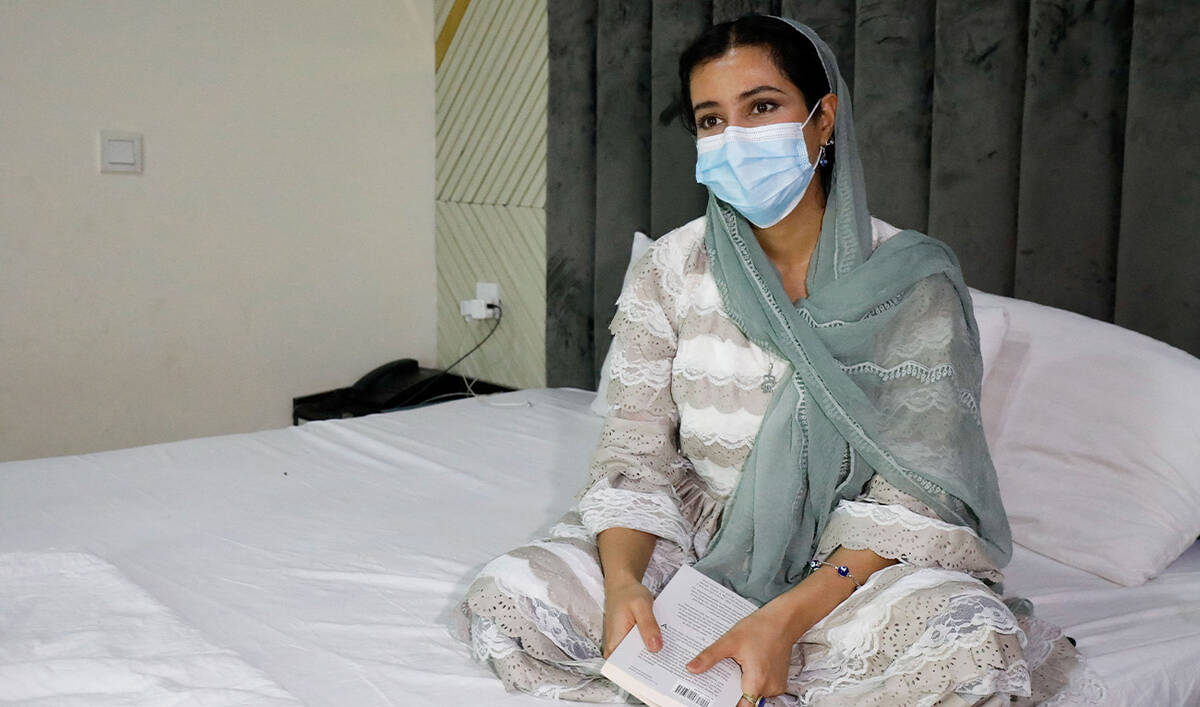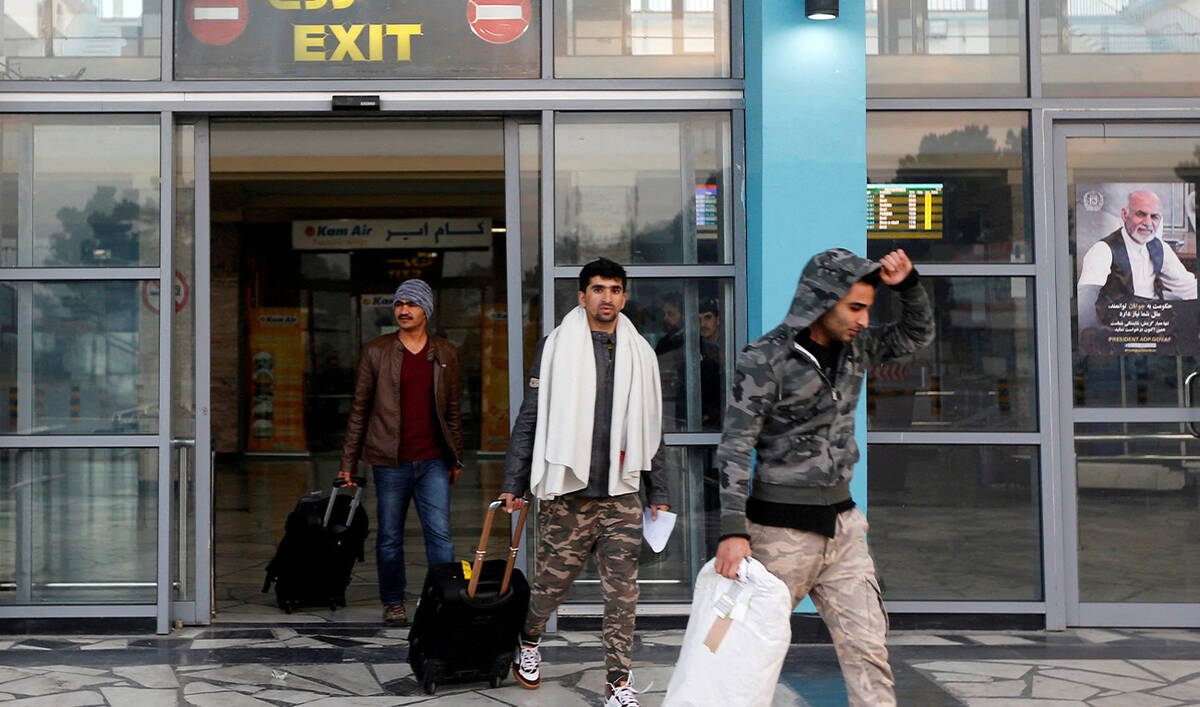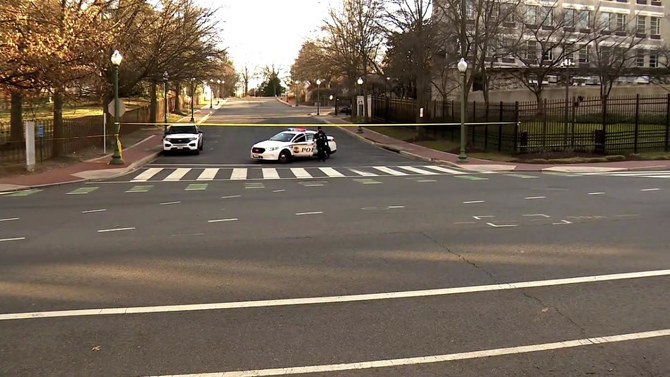WASHINGTON: An active member of the US Air Force has died after setting himself on fire outside the Israeli embassy in Washington over the weekend in protest of the war in Gaza, the Pentagon said Monday.
Emergency responders on Sunday had rushed to the scene just before 1:00 p.m. (1800 GMT) in response to a “call for person on fire outside the Israeli Embassy,” according to a message on X, formerly Twitter, by the capital city’s fire department.
They arrived to find that officers from the Secret Service — the US law enforcement agency tasked with protecting embassies in Washington — had already extinguished the fire.
The man had filmed himself shouting “Free Palestine” as he lit himself on fire, according to footage shared on social media.
He was initially transported to hospital with “critical life-threatening injuries,” the fire department said.
An Air Force spokeswoman told AFP Monday morning that the unnamed “individual involved in yesterday’s incident succumbed to his injuries and passed away last night.”
“We will provide additional details 24 hours after next-of-kin notifications are complete.”
A spokesperson for the Israeli embassy said no staff were injured in the incident, and that the man was “unknown” to them.
In the video shared on social media, the man is seen wearing military fatigues and declaring he will “not be complicit in genocide” before dousing himself in liquid.
He then lights himself on fire while yelling “Free Palestine!” until he falls on the ground.
The video was reportedly first shared in a livestream on the social platform Twitch.
The shocking act came as protests are increasing across the United States against Israel’s actions in Gaza, where it is waging a retaliatory war for an attack on October 7 by Hamas militants.
With the death toll in Gaza nearing 30,000, according to the Hamas-run health ministry there, international pressure has been increasing on the United States to rein in its ally Israel and call for a ceasefire.
US airman sets himself on fire outside Israeli embassy in Washington
https://arab.news/nhpmr
US airman sets himself on fire outside Israeli embassy in Washington

- The man had filmed himself shouting “Free Palestine” as he lit himself on fire, according to footage shared on social media
- In the video, the man is seen wearing military fatigues and declaring he will “not be complicit in genocide” before dousing himself in liquid
Saudi Arabia’s POS spending climbs 24.4% to $3.6bn in final week of June

RIYADH: Saudi Arabia’s point-of-sale transactions climbed to SR13.6 billion ($3.6 billion) in the week ending June 28, marking a 24.4 percent rise compared to the previous seven-day period, according to the latest official figures.
The point-of-sale transactions bulletin issued by the Saudi Central Bank showed that the number of transactions also rose by 8.6 percent to reach 219.9 million.
Spending on recreation and culture posted the highest weekly increase, surging 49.3 percent to reach SR294.7 million. The number of transactions in this category rose slightly to 2.26 million.
Clothing and footwear followed with a 44.2 percent surge in spending, totaling SR830.9 million. The number of transactions in this section rose 34.5 percent to 6.2 million.
Telecommunications came third, with a 38.7 percent increase in value to SR123.9 million and a rise in transactions to just over 2 million.
Spending on public utilities increased by 28.8 percent, reaching SR52.3 million through 690,000 transactions.
Gas stations registered SR963.5 million in transactions, up 18.4 percent from the prior week. Transaction volume climbed to 17.2 million.
Expenditures in the health sector reached SR840 million, an increase of 17.9 percent, while spending on transportation rose 18.7 percent to SR746 million. The number of transportation transactions hit 2.9 million.
Jewelry sales rose by 34.7 percent to reach SR352.7 million from 280,000 sales.
Education services recorded sales of SR 212.1 million, up 9.7 percent, with the number of transactions in the sector reached 118,000.
Sales at hotels reached SR212.5 million, a 28.3 percent weekly increase, while transactions advanced 26.4 percent to 680,000.
Spending on construction and building materials totaled SR328 million, representing a 7.9 percent boost from the previous week. The number of transactions stood at 1.7 million.
Among cities, Hail recorded the highest increase in POS transaction value, rising 41.5 percent to SR226.2 million across 4 million transactions.
Abha followed with a 37.6 percent rise in spending, totaling SR195.3 million from 3.48 million transactions.
Additional cities across the Kingdom contributed SR3.93 billion in POS sales, reflecting a 32.6 percent increase from the previous week.
Madinah posted SR516 million in transactions, up 27.7 percent, while Jeddah recorded SR1.93 billion, marking a 20.4 percent increase.
Makkah followed with SR471.7 million, up 20.2 percent from the prior week.
Riyadh remained the highest in overall value with SR4.68 billion in sales, a 19.7 percent weekly rise, and 70.3 million transactions.
Dammam registered SR673.3 million, increasing 18.1 percent.
Khobar and Buraidah posted SR385.7 million and SR327.7 million, respectively, while Tabuk reported SR278.5 million in POS spending.
PM: Ethiopia’s mega dam on the Nile ‘now complete’

- Prime Minister Abiy said the dam has been a source of tension with neighbors, notably Egypt
ADDIS ABABA: Ethiopia’s Prime Minister Abiy Ahmed on Thursday said that a contentious multi-billion-dollar mega-dam on the Blue Nile is now complete and set to be officially inaugurated in September.
“The Grand Ethiopian Renaissance Dam is now complete, and we are preparing for its official inauguration,” Abiy told parliament of the dam that has been a source of tension with neighbors, notably Egypt.
Afghan refugees stuck in Pakistan as Germany halts entry program

- Berlin halts at-risk Afghan resettlement as political shift curbs migration pathways
- Over 2,400 Afghans await entry as suspended admission program under review
BERLIN/ISLAMABAD, July 3 : In a cramped guesthouse in Pakistan’s capital, 25-year-old Kimia spends her days sketching women — dancing, playing, resisting — in a notebook that holds what’s left of her hopes.
A visual artist and women’s rights advocate, she fled Afghanistan in 2024 after being accepted on to a German humanitarian admission program aimed at Afghans considered at risk under the Taliban.
A year later, Kimia is stuck in limbo.
Thousands of kilometers away in Germany, an election in February where migration dominated public debate and a change of government in May resulted in the gradual suspension of the program.
Now the new center-right coalition intends to close it.
The situation echoes that of nearly 1,660 Afghans cleared to settle in the United States, but who then found themselves in limbo in January after US President Donald Trump took office and suspended refugee programs.
Kimia’s interview at the German embassy which she hoped would result in a flight to the country and the right to live there, was abruptly canceled in April.
Meanwhile, Germany pays for her room, meals and medical care in Islamabad.
“All my life comes down to this interview,” she told Reuters. She gave only her artist name for fear of reprisal.
“We just want to find a place that is calm and safe,” she said of herself and the other women at the guesthouse.

The admission program began in October 2022, intending to bring up to 1,000 Afghans per month to Germany who were deemed at risk because of their work in human rights, justice, politics or education, or due to their gender, religion or sexual orientation.
However, fewer than 1,600 arrived in over two years due to holdups and the cancelation of flights.
Today, around 2,400 Afghans are waiting to travel to Germany, the German foreign ministry said. Whether they will is unclear. NGOs say 17,000 more are in the early stages of selection and application under the now dormant scheme.
The foreign ministry said entry to Germany through the program was suspended pending a government review, and the government will continue to care for and house those already in the program.
It did not answer Reuters’ questions on the number of canceled interviews, or how long the suspension would last.
Reuters spoke with eight Afghans living in Pakistan and Germany, migration lawyers and advocacy groups, who described the fate of the program as part of a broader curb on Afghan asylum claims in Germany and an assumption that Sunni men in particular are not at risk under the Taliban.
The German government says there is no specific policy of reducing the number of Afghan migrants. However, approval rates for Afghan asylum applicants dropped to 52 percent in early 2025, down from 74 percent in 2024, according to the Federal Migration Office (BAMF).
POLITICAL SHIFT
Kabul fell to the Taliban in August 2021. Since May 2021 Germany has admitted about 36,500 vulnerable Afghans by various pathways including former local staff, the government said.
Thorsten Frei, chief of staff to Germany’s new chancellor Friedrich Merz, said humanitarian migration has now reached levels that “exceed the integration capacity of society.”
“As long as we have irregular and illegal migration to Germany, we simply cannot implement voluntary admission programs.”

The interior ministry said programs like the one for Afghans will be phased out and they are reviewing how to do so.
|Several Afghans are suing the government over the suspension. Matthias Lehnert, a lawyer representing them, said Germany could not simply suspend their admissions without certain conditions such as the person no longer being at risk.
Since former chancellor Angela Merkel opened Germany’s borders in 2015 to over a million refugees, public sentiment has shifted, partly as a result of several deadly attacks by asylum seekers. The far-right Alternative for Germany party (AfD), capitalizing on the anti-migrant sentiment, surged to a historic second-place finish in February’s election.
Afghans Reuters spoke with said they feared they were being unfairly associated with the perpetrators, and this was putting their own lives at risk if they had to return to Afghanistan.
“I’m so sorry about those people who are injured or killed ... but it’s not our fault,” Kimia said.
Afghan Mohammad Mojib Razayee, 30, flew to Germany from Cyprus in March under a European Union voluntary solidarity mechanism, after a year of waiting with 100 other refugees. He said he was at risk after criticizing the Taliban. Two weeks after seeking asylum in Berlin, his application was rejected.
He was shocked at the ruling. BAMF found no special protection needs in his case, a spokesperson said.
“It’s absurd — but not surprising. The decision-making process is simply about luck, good or bad,” said Nicolas Chevreux, a legal adviser with AWO counseling center in Berlin.
Chevreux said he believes Afghan asylum cases have been handled differently since mid-2024, after a mass stabbing at a rally in the city of Mannheim, in which six people were injured and a police officer was killed. An Afghan asylum seeker was charged and is awaiting trial.

‘YOU DON’T LIVE’
Spending most days in her room, surrounded by English and German textbooks, Kimia says returning to Afghanistan is unthinkable. Her art could make her a target.
“If I go back, I can’t follow my dreams — I can’t work, I can’t study. It’s like you just breathe, but you don’t live.”
Under Taliban rule, women are banned from most public life, face harassment by morality police if unaccompanied by a male guardian, and must follow strict dress codes, including face coverings. When security forces raided homes, Kimia said, she would frantically hide her artwork.
The Taliban say they respect women’s rights in accordance with their interpretation of Islamic law and local culture and that they are not targeting former foes.
Hasseina, is a 35-year-old journalist and women’s rights activist from Kabul who fled to Pakistan and was accepted as an applicant on to the German program.
Divorced and under threat from both the Taliban and her ex-husband’s family, who she says have threatened to kill her and take her daughter, she said returning is not an option.
The women are particularly alarmed as Pakistan is intensifying efforts to forcibly return Afghans. The country says its crackdown targets all undocumented foreigners for security reasons. Pakistan’s foreign ministry did not respond to request for comment on how this affects Afghans awaiting German approval.
The German foreign ministry has said it is aware of two families promised admission to Germany who were detained for deportation, and it was working with Pakistan authorities to stop this.
Marina, 25, fled Afghanistan after being separated from her family. Her mother, a human rights lawyer, was able to get to Germany. Marina has been waiting in Pakistan to follow her for nearly two years with her baby.
“My life is stuck, I want to go to Germany, I want to work, I want to contribute. Here I am feeling so useless,” she said.
Liverpool’s Portuguese forward Diogo Jota dies in car crash in Spain

- Spanish police confirmed the death of Diogo Jota and his brother
MADRID: Liverpool's Portuguese forward Diogo Jota, 28, died in a car crash near Zamora in northwestern Spain with his brother, the Portuguese Football Federation said on Thursday.
The regional fire department of Castile and Leon, where Zamora is located, said on its website a car crashed early on Thursday, shortly after midnight, and burst into flames, with two men, aged 28 and 26, found dead.
"We have lost two champions. Their deaths represent irreparable losses for Portuguese football, and we will do everything we can to honour their legacy every day," the Portuguese Football Federation said in a statement.
Spanish police told Reuters they could not yet officially confirm the names of the deceased, but everything pointed to it being Jota and his brother. The Lamborghini they were travelling veered off the road, the spokesperson said.
The bodies have been taken to a forensics unit in nearby Zamora where autopsies will be performed, they said.
Jota, who got married on June 28, helped Liverpool win the Premier League last season and also won the FA Cup and League Cup with the Merseyside outfit.
Jota arrived at Anfield from Wolverhampton Wanderers in 2020 and scored 65 goals in 182 appearances for the club in all competitions.
He also made 49 appearances for Portugal, twice winning the UEFA Nations League.
China denies military base ambitions in Pacific Islands

- China has established a police presence in Solomon Islands, Kiribati and Vanuatu
- Former US Deputy Secretary of State Kurt Campbell urged the Trump administration to keep its focus on the region because China wanted to build bases in the Pacific Islands
SYDNEY: China’s embassy in Fiji denied on Thursday that Beijing wanted a military base or sphere of influence in the Pacific Islands, after Fiji’s Prime Minister Sitiveni Rabuka said islands were trying to cope with a powerful China seeking to spread its influence.
“The claims about China setting up a military base in the Pacific are false narratives,” an embassy spokesperson said in a statement.
“China’s presence in the Pacific is focused on building roads and bridges to improve people’s livelihoods, not on stationing troops or setting up military bases.”
Rabuka said on Wednesday his country had development cooperation with China, but was opposed to Beijing establishing a military base in the region. In any case, China did not need a base to project power in the region, he added.
China tested an intercontinental ballistic missile in September that flew over Fiji to land 11,000 km (6,800 miles) from China in the international waters of the Pacific Ocean.
“If they can very well target an empty space they can very well target occupied space,” Rabuka told the National Press Club in Canberra. Washington became concerned about China’s ambition to gain a military foothold in the
Pacific Islands in 2018 when Beijing sought to redevelop a naval base in Papua New Guinea and a military base in Fiji. China was outbid by Australia for both projects. The concern resurfaced in 2022 when China signed a security pact with Solomon Islands, prompting Washington to warn it would respond if Beijing established a permanent military presence. In November, the outgoing US Deputy Secretary of State Kurt Campbell urged the Trump administration to keep its focus on the region because China wanted to build bases in the Pacific Islands.
The Chinese embassy spokesperson said Fiji and China respect each other’s sovereignty.
“China has no interest in geopolitical competition, or seeking the so-called ‘sphere of influence’,” the statement added.
China has established a police presence in Solomon Islands, Kiribati and Vanuatu.


















